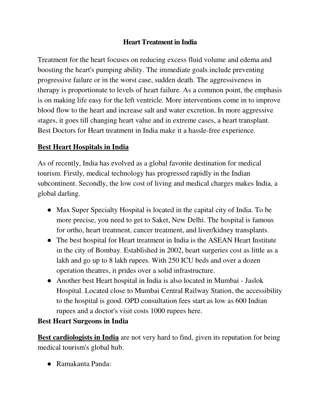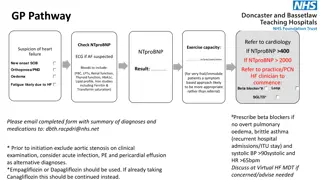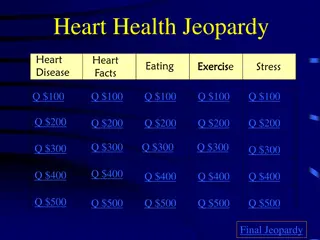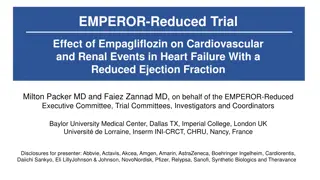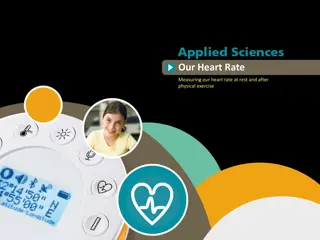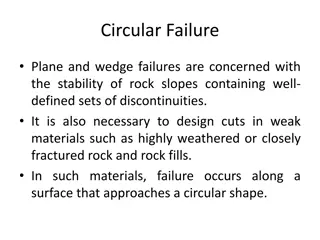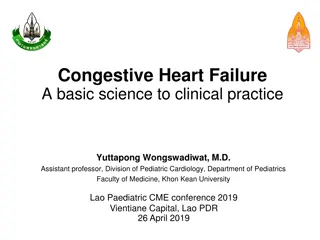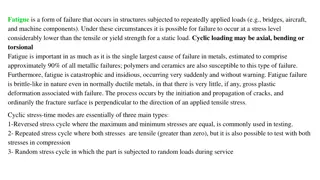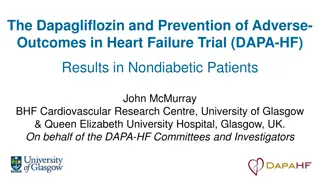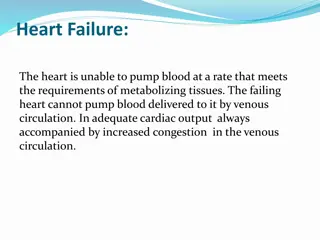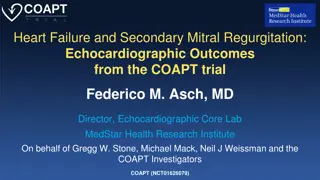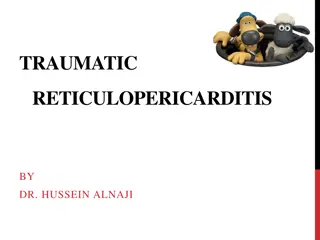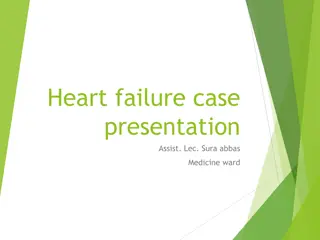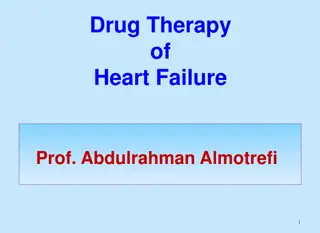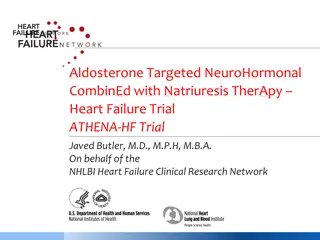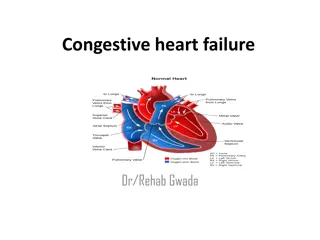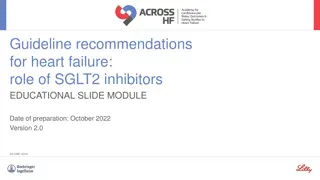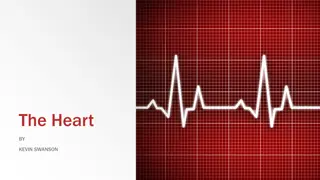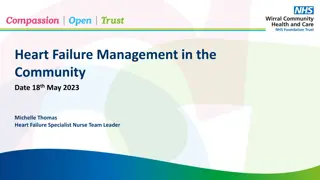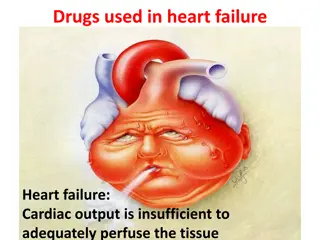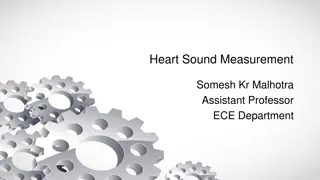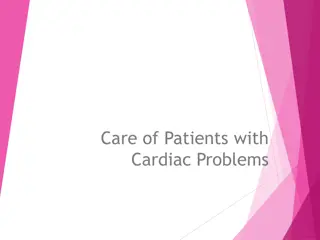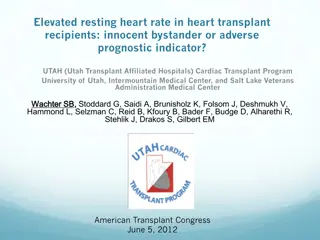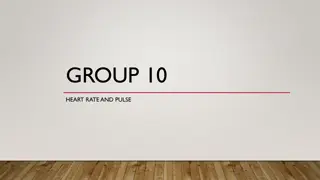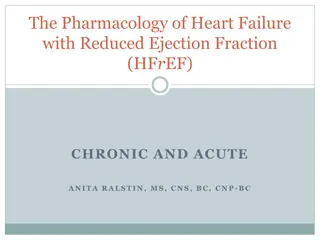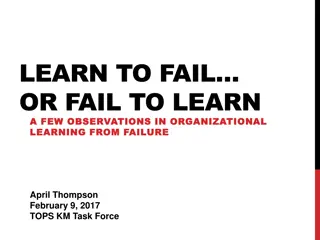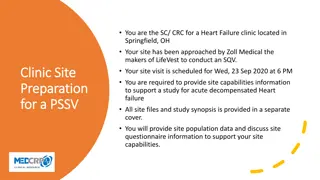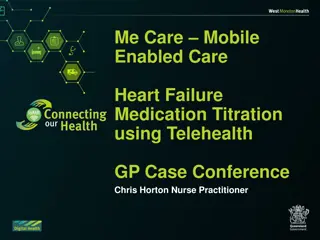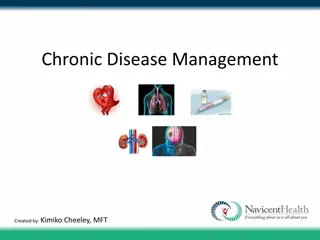FAILURE ANALYSIS
Failure analysis is crucial for addressing disruptions in components or assemblies, preventing recurrence, and ensuring safety. Explore the causes of failure, general procedures, and key considerations in failure analysis to enhance reliability and performance.
0 views • 49 slides
Top Heart Hospitals in India for heart treatment
India has many top heart hospitals in the world that are renowned for their advanced cardiac care, world-class facilities, and best heart treatments. These hospitals have highly skilled and best cardiologists in India with the latest technology. Dr. Naresh Trehan is the best cardiologist in India. S
4 views • 2 slides
Efficacy and Safety of Ferric Carboxymaltose for Heart Failure with Iron Deficiency
Iron deficiency is prevalent in heart failure patients with reduced ejection fraction and is linked to poor outcomes. The HEART-FID trial investigates the impact of intravenous ferric carboxymaltose (FCM) on all-cause mortality, heart failure hospitalizations, and exercise capacity in chronic HFrEF
1 views • 17 slides
Selective Aldose Reductase Inhibitor for Diabetic Cardiomyopathy Treatment
The ARISE-HF study presents primary results on the effectiveness of a selective aldose reductase inhibitor in treating diabetic cardiomyopathy, a common complication of diabetes mellitus leading to heart failure. The study highlights the increased risk of heart failure in individuals with diabetes,
2 views • 23 slides
Heart Treatment Cost in India
Heart disease is one of the most serious problems that require constant care. Heart treatment cost in India has increased significantly with time. In such a situation, heart treatment is being taken very seriously. A healthy diet must be followed every day. You have to use fiber, heart-healthy eleme
4 views • 2 slides
Pragmatic Urinary Sodium-Based Treatment Algorithm in Acute Heart Failure (PUSH-AHF) Trial Overview
The PUSH-AHF trial, conducted at the University Medical Center Groningen, aimed to evaluate the effectiveness and safety of natriuresis-guided diuretic therapy in acute heart failure. The study design was pragmatic, prospective, single-center, open-label, randomized, and controlled. Key outcomes inc
2 views • 20 slides
Heart Treatment in India
Treatment for the heart focuses on reducing excess fluid volume and edema and boosting the heart's pumping ability. The immediate goals include preventing progressive failure or in the worst case, sudden death. The aggressiveness in therapy is proportionate to levels of heart failure. As a common po
0 views • 2 slides
Heart Failure Pathway Information and Contact Details
This detailed pathway outlines the diagnostic and management steps for suspected heart failure, including NTproBNP levels, exercise capacity assessment, blood tests, and medication initiation criteria. It also provides information on Virtual HF MDT consultations, specialist support, and contact deta
1 views • 4 slides
Heart Health Jeopardy - Test Your Knowledge on Heart Disease
Test your knowledge on heart disease with this Heart Health Jeopardy game. Learn about heart disease facts, statistics, risk factors, and common types of heart diseases. Understand the importance of recognizing heart attack symptoms and the significance of factors like high blood pressure, high chol
0 views • 58 slides
Embracing Failure: Stories of Resilience and Success
Discover the transformative power of failure through the inspiring stories of Neil Gaiman, Michael Jordan, Oprah Winfrey, and Thomas Edison. These remarkable individuals show us that failure is not the end but a stepping stone to growth, innovation, and success. Embrace mistakes, learn from them, an
0 views • 10 slides
Empagliflozin Effects on Heart Failure with Reduced Ejection Fraction: EMPEROR-Reduced Trial Overview
Empagliflozin's impact on cardiovascular and renal events in heart failure with reduced ejection fraction was assessed in the EMPEROR-Reduced trial led by Milton Packer, MD, and Faiez Zannad, MD. The trial, enriched for patients with severe left ventricular dysfunction, randomized participants to em
2 views • 22 slides
Understanding Heart Rate Variations During Rest and Exercise
This experiment focuses on measuring heart rate at rest and after physical exercise, exploring the factors that influence heart rate changes. Through hands-on activities and theoretical lessons, students learn about the cardiac cycle, the circulatory system, and the impact of physical exertion on he
1 views • 22 slides
Understanding and Nurturing a Healthy Heart: Physical and Spiritual Insights
Delve into the importance of maintaining a healthy heart, both physically and spiritually. Learn about the impact of blockages on heart health, practical tips for physical well-being, and the significance of spiritual stewardship. Explore the connection between heart conditions and stewardship, alon
0 views • 21 slides
Understanding Circular Failure in Rock Slopes: Causes and Design Considerations
Circular failure in rock slopes, such as those containing discontinuities or weak materials like highly weathered or fractured rock, occurs along circular surfaces. This type of failure is common when geological features are not clearly defined. Factors influencing circular failure, conditions under
0 views • 21 slides
Understanding Congestive Heart Failure: From Pathophysiology to Clinical Practice
Congestive heart failure (CHF) is a condition characterized by systemic and pulmonary congestion due to the heart's inability to pump sufficient blood for the body's metabolism. It is closely linked to age and involves pathophysiology related to preload, afterload, contractility, and heart rate. Man
0 views • 20 slides
Understanding Fatigue Failure in Structural Materials
Fatigue failure is a common form of structural failure caused by repetitive loading, especially in metals but also affecting polymers and ceramics. This type of failure can occur at stress levels much lower than the material's static strength, often leading to sudden and catastrophic breaks without
0 views • 9 slides
DAPA-HF Trial: Dapagliflozin in Heart Failure Patients without Diabetes
The DAPA-HF trial investigated the use of dapagliflozin, an SGLT2 inhibitor, in patients with heart failure and reduced ejection fraction, regardless of diabetes status. Funded by AstraZeneca, the study enrolled 4,744 patients from 20 countries, showing promising results in reducing cardiovascular d
3 views • 22 slides
Understanding Heart Failure and Congenital Heart Diseases
Heart failure is a condition where the heart struggles to pump blood efficiently, leading to various complications. It can affect different sides of the heart, with causes ranging from coronary artery disease to valve problems. Congenital heart diseases, on the other hand, are common anomalies prese
0 views • 19 slides
Echocardiographic Outcomes in Heart Failure Patients with Secondary Mitral Regurgitation: COAPT Trial
This study presents the echocardiographic outcomes from the COAPT trial focusing on heart failure patients with secondary mitral regurgitation. The trial evaluated the impact of MitraClip therapy in conjunction with guideline-directed medical therapy compared to medical therapy alone. Results showed
0 views • 27 slides
Traumatic Reticulopericarditis in Livestock: Causes, Symptoms, and Management
Traumatic reticulopericarditis in livestock is caused by penetration of the pericardial sac by a migrating metal foreign body, leading to pericarditis, toxemia, and congestive heart failure. Clinical signs include depression, anorexia, respiratory distress, and bilateral jugular distension. If chron
0 views • 13 slides
Understanding Hypertrophic Cardiomyopathy (HCM) in a Middle-Aged Female with Heart Failure
A 55-year-old female with a history of hypertension and heart failure presented with symptoms of dyspnea, chest pain, and a positive family history of cardiac disease. Exam findings included LVH on ECG and a systolic murmur at LLSB. This case highlights the importance of recognizing and managing hyp
0 views • 20 slides
Comprehensive Heart Failure Case Presentation: Diagnosis and Treatment Plan
A 68-year-old man with a history of CAD and diabetes presents with symptoms of heart failure, including dyspnea and fluid retention. His medical history, physical exam, and diagnostic tests reveal signs consistent with heart failure. Further evaluation and treatment planning are necessary to manage
0 views • 28 slides
Drug Therapy of Heart Failure
Explore the various classes of drugs used for treating acute and chronic heart failure, including their mechanisms of action, pharmacological effects, clinical uses, adverse effects, and interactions with other drugs. Learn about the causes, symptoms, pathophysiology, and factors affecting cardiac o
0 views • 51 slides
Study on High-Dose Spironolactone in Acute Heart Failure Patients
The ATHENA-HF trial investigates the impact of high-dose spironolactone on reducing NT-proBNP levels in acute heart failure patients. Key objectives include assessing congestion, dyspnea relief, urine output, weight change, diuretic requirement, and outcomes like mortality and readmissions up to 60
0 views • 20 slides
Understanding Congestive Heart Failure: Causes, Pathophysiology, and Management
Congestive heart failure (CHF) is a condition where the heart cannot pump enough blood to meet the body's needs, often caused by conditions like hypertension and coronary artery disease. Factors affecting cardiac output include preload, heart rate, stroke volume, afterload, and contractility. The pa
0 views • 23 slides
Guideline Recommendations for SGLT2 Inhibitors in Heart Failure
This educational slide module provides an overview of the guideline recommendations for SGLT2 inhibitors in the treatment of heart failure, including HFrEF, HFmrEF, and HFpEF. It covers recommendations from AHA, ACC, HFSA, ESC, CCS, and CHFS guidelines, highlighting the role of SGLT2 inhibitors as a
0 views • 28 slides
Understanding Heart Disease: Causes, Symptoms, and Common Conditions
Heart disease, a prevalent health issue in the United States, encompasses various cardiovascular conditions like coronary artery disease and hypertension. It is a leading cause of death, often resulting from conditions that can lead to heart attacks or failure. Symptoms of heart conditions vary, fro
0 views • 28 slides
Comprehensive Approach to Heart Failure Management in the Community
This detailed guide covers the signs of decompensation in heart failure patients, actions to take in primary care including diagnostic tests like echocardiograms, and treatment strategies for fluid overload, blood pressure control, heart rate management, and comorbidities like COPD and renal issues.
0 views • 6 slides
Therapeutic Strategies in Heart Failure Management
Heart failure is a serious condition characterized by inadequate cardiac output. Compensatory responses include sympathetic nervous system activation, renin-angiotensin-aldosterone system stimulation, and natriuretic peptide release. Pharmacologic therapies target salt and water retention, afterload
0 views • 25 slides
Understanding Heart Sound Measurement in Cardiac Auscultation
Heart sound measurement plays a crucial role in cardiac auscultation. This process involves listening to the four basic heart sounds produced by various mechanisms in the heart, such as valve closure, abnormal valve opening, ventricular chamber vibrations, chordae tendineae tension, and turbulent bl
0 views • 5 slides
Understanding Cardiac Problems and Heart Failure
This educational content covers essential information on caring for patients with cardiac problems, including blood flow through the heart, causes and types of heart failure, such as left-sided and right-sided heart failure, as well as high-output failure. It also discusses the classification and st
0 views • 24 slides
Elevated Resting Heart Rate in Heart Transplant Recipients: A Prognostic Indicator?
Elevated resting heart rate is being investigated as a potential adverse prognostic indicator in heart transplant recipients. This study aims to determine if sustained tachycardia increases the risk of all-cause mortality and cardiac allograft vasculopathy in these patients through a retrospective a
0 views • 21 slides
Understanding Heart Rate and Pulse: Key Differences and Measurement
Heart rate, also known as pulse, is the number of times your heart beats per minute. It varies based on factors like age, fitness level, and emotions. Pulse is a direct measure of heart rate. Learn about the differences between heart rate and blood pressure, how to measure heart rate, and what const
0 views • 8 slides
Pharmacology of Heart Failure with Reduced Ejection Fraction (HFrEF)
Understanding the pharmacology of heart failure with reduced ejection fraction is crucial as it impacts millions of Americans and poses significant healthcare costs. The complex pathophysiology involves mechanisms like the Frank-Starling mechanism, alterations in myocyte regeneration, neurohumoral s
0 views • 44 slides
Observations in Organizational Learning from Failure
Explore the importance of learning from failure in organizational settings through initiatives such as failure forums, peer-assisted problem-solving sessions, and reframing failure as a stepping stone to success. Encouraging open discussion of failure, sharing experiences externally, and promoting a
1 views • 6 slides
Heart Failure Clinic in Springfield, OH - Site Visit for LifeVest Study
Heart Failure clinic in Springfield, OH has been approached by Zoll Medical to conduct a study on acute decompensated heart failure. The clinic's capabilities, staff, and procedures for patient recruitment during COVID-19 are discussed. The study focuses on patients with systolic or diastolic heart
0 views • 14 slides
Macromechanical Analysis of Lamina and Tsai-Hill Failure Theory Overview
The Tsai-Hill failure theory is based on the strengths of a unidirectional lamina, incorporating longitudinal and transverse tensile and compressive strengths, as well as in-plane shear strength. This theory, derived from the distortion energy theory, provides criteria for determining lamina failure
0 views • 15 slides
Telehealth in Heart Failure Management: Improving Outcomes through Digital Solutions
Research indicates that telehealth programs play a significant role in managing chronic heart failure, leading to reduced all-cause mortality, decreased hospitalizations, and improved quality of care. Studies highlight the effectiveness of telehealth in monitoring symptoms, enhancing patient outcome
0 views • 21 slides
MESA Heart Failure Study: Research Aims and Findings
The MESA Heart Failure Study led by Shah and Bertoni aims to determine the prevalence of early heart failure, explore the pathogenesis through risk factor associations, biomarkers, and machine learning analyses, and understand phenotypic signatures related to heart failure subtypes. The study involv
0 views • 10 slides
Understanding Heart Failure: Types, Symptoms, and Management
Heart failure is a serious condition where the heart can't pump enough blood. Learn about left-sided and right-sided heart failure, symptoms, diagnostic testing like echocardiogram, and medical treatments including medication management. Proper management involves lifestyle changes, monitoring fluid
0 views • 46 slides






